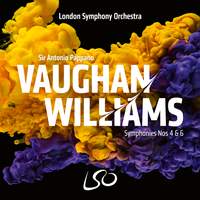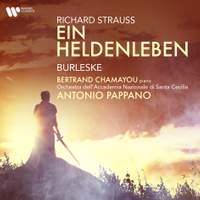Recording of the Week,
Vaughan Williams from Antonio Pappano and the London Symphony Orchestra
Among the innumerable performances that take place each year – under normal conditions, at least – occasionally circumstances combine to make an event go down in history for reasons beyond the merely musical. The classic example might be Rostropovich’s emotionally-fraught Proms performance of Dvořák’s Cello Concerto as 1968’s Warsaw Pact invasion unfolded in Czechoslovakia, or the concerts given by Bernstein in a newly-reunified Berlin in 1989. Today’s Recording of the Week is no less worthy to join that pantheon: Antonio Pappano and the LSO’s pairing of live recordings of Vaughan Williams’s troubled Fourth and Sixth symphonies, the latter recorded on the eve of the UK’s plunge into the unknown with the first Covid-19 lockdown.
 Even without that added emotional ratchet, Pappano’s accounts would surely have been utterly gripping. From the first grinding dissonances of the Fourth it’s clear that he understands these works on a profound level. He intentionally keeps the opening tempo on the fast side, pushing the music onwards slightly faster than feels comfortable, rather than letting the wide intervals turn into a majestic stride at odds with the composer’s uncomfortable intentions.
Even without that added emotional ratchet, Pappano’s accounts would surely have been utterly gripping. From the first grinding dissonances of the Fourth it’s clear that he understands these works on a profound level. He intentionally keeps the opening tempo on the fast side, pushing the music onwards slightly faster than feels comfortable, rather than letting the wide intervals turn into a majestic stride at odds with the composer’s uncomfortable intentions.
Aside from his widely-acclaimed 2018 triptych of Bernstein’s symphonies, Pappano’s conducting focus has been largely on opera in recent years; he has been music director of the Royal Opera House since 2002, as well as recording Verdi's Aida and Otello with the Orchestra dell'Accademia di Santa Cecilia (the former garnering armfuls of awards on release in 2015). Let it not be thought, though, that symphonic repertoire lies outside his comfort-zone. One thing he captures particularly magnificently here – the equal even of Handley, who I’ve long considered the benchmark for Vaughan Williams’s symphonies – is the muted numbness of the quieter moments that Andrew Huth’s programme notes aptly describe as being in “emotional limbo”. The Fourth’s second movement is often overshadowed by the merciless angularity of the first and the frenetic energy of the third, but in Pappano’s hands it becomes no less engaging: he imbues its stillness with a world-weariness that put me in mind of Shostakovich. Even when tantalising glimmerings of light seem to emerge at the movement’s close, he somehow keeps the music agonisingly – but quite rightly – devoid of comfort.
In these two symphonies filled with, and responding to, conflict and horror, there is really only one brief moment of true relaxation: the spine-tingling, luminous tutti at the end of the first movement of the Sixth Symphony. After the Fourth, and the similarly unrelenting material of the rest of the movement, I was almost dreading this section – would Pappano’s uncompromising vision leave it, too, shorn of its catharsis? Fortunately not: the brief glimpse of sunlit uplands is deeply yearning and impassioned, all the more powerful for being such an isolated exception. I can only imagine the impact this passage would have had on both orchestra and audience on the night, as the country – like so many others – prepared to head into uncharted waters.
The final movement of the Sixth is perhaps its best-known and most-discussed. It’s a movement that has been ascribed all kinds of “meanings”, often interpreted as a vision of the aftermath of a nuclear apocalypse (despite Vaughan Williams’s famous retort that “it never seems to occur to people that a man might just want to write a piece of music”). More than any other movement, it presents the conductor with the curious task of ensuring that their musicians’ natural tendency towards expression and nuance does not inadvertently splash a drop of colour onto the composer’s deliberately monochrome canvas. Pappano succeeds chillingly well in this; the transition from the unsheathed brutality of the third movement into the musical void of the fourth is masterful, and his Epilogue ranks as one of the most convincingly desolate I’ve ever heard. In mid-2021 it’s hard not to re-hear this lifeless musical wasteland as a metaphor for the near-total shutdown of artistic and cultural life that’s affected much of the world over the past twelve months.
If his recent operatic focus was still cause for any doubt that Pappano is every bit a symphonist, this album should dispel such concerns. His recent selection as the LSO’s next Chief Conductor (with Simon Rattle handing over the baton in 2023) surprised many people, myself included, but these two symphony accounts – intelligent yet harrowing – surely vindicate that decision in and of themselves.
London Symphony Orchestra, Antonio Pappano
Available Formats: SACD, MP3, FLAC, Hi-Res FLAC
Strauss: Ein Heldenleben & Burleske
Bertrand Chamayou (piano), Orchestra dell’Accademia Nazionale di Santa Cecilia, Antonio Pappano
Looking ahead to next month, 14th May sees the release of a new recording of two early Strauss works from Pappano and his Roman orchestra, of which he's been Music Director since 2005; it was announced this week that Pappano will assume the title of Music Director Emeritus of the Santa Cecilia Orchestra in October 2023, when he also becomes Chief Conductor Designate at the LSO.
Available Formats: CD, MP3, FLAC, Hi-Res FLAC




